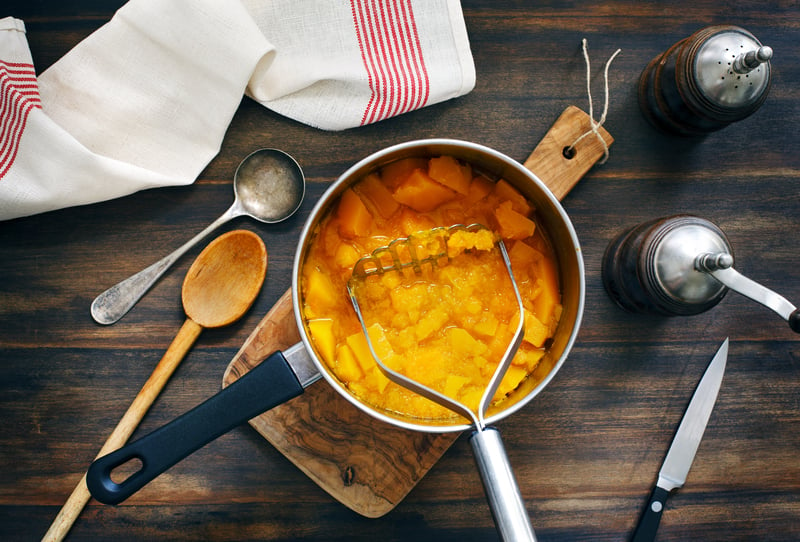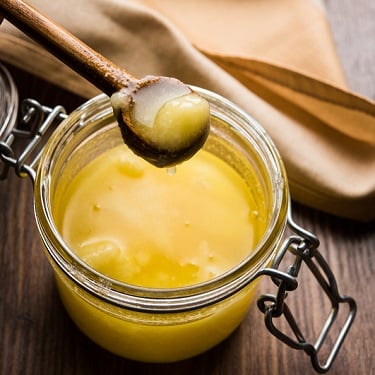17 Egg Substitutes for Everyday Cooking and Baking Recipes

The incredible, edible egg is one of our favorite foods. It’s loaded with nutrition, it’s versatile, and of course, it’s considered a required ingredient for many baked recipes. Sometimes, though, you don’t want to use eggs or can’t find them. Luckily, many egg substitutes can pitch-hit no matter why you’re avoiding eggs.
Why Substitute Eggs?
It’s been beaten into a lot of us that eggs are “unhealthy,” especially for people with high cholesterol levels or who have a high risk of heart disease. Fortunately, led by researchers and nutritionists, many now understand that eggs have no appreciable impact on cholesterol levels. And, in fact, eggs can be part of a heart- and brain-healthy diet.
That said, there are still good reasons to find suitable egg substitutes for your recipes, including:
- Egg allergies—the second most common food allergy in the U.S. is to eggs. Fortunately, this is more common in kids under three, and most people outgrow the allergy by the time they’re five years old. However, it can continue into adulthood. If you or anyone in your household has an allergy, it just makes sense to go eggless, at least at home.
- Following a vegan diet—if you’re choosing to avoid eating animal products—including meat, dairy, or eggs—due to health, environmental, or ethical concerns, then eggs are obviously off the menu.
- You can’t find them—if you depend on local producers (or your own hens), there are times of the year when it’s harder to get eggs. That’s because how many eggs chickens lay depends greatly on the season and the number of daylight hours. During the winter, that translates to few, if any, eggs from backyard chickens.
- The costs have skyrocketed—the costs of eggs in December 2022 were over twice the cost they were a year prior due to the recent avian flu outbreak, followed by supply and demand issues, and corporations increasing profits by up to 40% to capitalize on the situation. While wholesale egg prices are beginning to come down (up to 50% since December), the decrease may or may not have reached your local grocery store. So, many folks are still looking for egg substitutes to help keep their overall grocery bills lower.
Egg Substitutes
If you enjoy a sunny-side-up breakfast or a hard-boiled egg for a snack, whole eggs probably remain your best choice, but you still have options. And if you’re using eggs for baking or you like your eggs scrambled, there are a surprising number of egg substitutes to choose from that may be nearly as good as the real thing.
In baking, eggs are used for binding ingredients together to give your recipe the right texture and structure. They also are used to help foods rise by creating pockets of air (as a leavening agent), which gives recipes a light, airy texture. This is why egg whites are used in soufflés, angel food cakes, and meringues. Eggs also increase moisture in recipes as well as enhance the flavor and appearance. And, of course, they provide added protein.
The best egg substitutes depend on the recipes and how it’s used. Some options to consider include:
1. Applesauce
Applesauce helps bind the ingredients and adds moisture. Choose an unsweetened applesauce (or make your own), so you don’t add too much sugar to your recipe. A quarter cup of applesauce can replace one egg.
Because fruit can change the flavor profile of your recipe, look further down the list for other alternatives if apple doesn’t seem like the right flavor to go with your recipe.
As an added benefit, because even unsweetened applesauce is sweet, you can cut back on other sweeteners when it’s used in most recipes.
2. Aquafaba
Aquafaba (the liquid left after cooking chickpeas as found in the can) provides a similar amount of carbohydrates and proteins and can help emulsify, bind, and thicken recipes similar to the way eggs do. Use three tablespoons in place of each egg and whip until foaming. It can even be used in place of whipped egg whites when well-blended with an electric mixer.
3. Arrowroot Powder
Arrowroot Powder is more commonly known as a thickener to use instead of cornstarch or flour. It’s made from a tuber that grows in South America. And when two tablespoons are combined with three tablespoons of water to create a slurry, it can replace one egg.
4. Avocado
Avocado can be mashed and used to replace eggs as a binding agent in various recipes and provides a rich, creamy texture. A quarter cup of mashed avocado can replace one egg in brownies, cakes, muffins, and some breads.
5. Baking Soda and Vinegar
If you’ve ever made a depression-era cake, you’re well aware of how well this combination works. These two pantry staples bubble up to help your recipe rise. This provides a light, airy texture for baked cupcakes, cakes, and breads. No wonder it’s the go-to egg substitution for many vegan cooks. You likely won’t even be able to tell you left the eggs out. Use 1 Tbsp of vinegar (white distilled or apple cider) + 1 tsp baking soda to replace each egg.
6. Bananas
Bananas can be mashed and used to replace eggs for sweeter recipes that combine well with a mild banana-y flavor. Bananas add a nice creaminess but won’t add a lot of volume or help your dish rise. Use ¼ cup to replace 1 egg. And again, because they are so sweet, you can reduce other sweeteners in the recipe.
7. Buttermilk
Buttermilk works well to help bind and moisten flours for baked goods, though it does need to be combined with a leavening agent. It also can’t be used for vegan recipes and provides a tangy flavor, so you’ll want to consider the recipe. Add ¼ cup in place of 1 egg.
8. Carbonated Water
Carbonated water is perhaps the easiest, most affordable, lowest-calorie, and most surprising egg substitute. It results in baked recipes (e.g., muffins, cakes, and breads) almost indistinguishable from their egg-containing counterparts. Use a quarter cup to replace one egg.
9. Chia Seeds
Chia seeds are an excellent option for egg replacement. Add one tablespoon of whole seeds to three tablespoons of water, let rest for five or so minutes, and then use to replace eggs in your baked goods recipe.
As an added benefit, chia seeds are nutritious and rich in omega-3 fats, fibers, and polyphenols. Chia seeds also add more of a nutty flavor and a bit of crunch that works well in pancakes, waffles, and muffins.
To ensure the recipe raises as expected, you can also add ½ tsp of baking powder to the hydrated chia seeds once they’ve gelled.
10. Commercial Egg Replacers
Commercial egg replacers are made by a variety of brands, including Bob’s Red Mill Egg Replacer, Ener-G Egg Replacer, and Organ Egg Replacer, which are typically made with starches from potato, tapioca, with raising agents (e.g., calcium carbonate or calcium lactate), and other ingredients to help mimic egg-like behavior for baking recipes.
Other vegan alternatives include The Vegg, made with fortified nutritional yeast, salt, and beta-carotene; JU ST Egg, made from mung bean protein, vegetable oil, and other ingredients; and the Vegan Egg, made with soymilk powdered cellulose combined with other ingredients.
All of these egg replacements differ and thus have different instructions and amounts to equal one egg. Some may even contain real eggs, so read the label to ensure you have no allergies or concerns with the other ingredients found in the product.
11. Flaxseed
Flaxseed is another common egg substitute in vegan dishes. Take one tablespoon of ground flax combined with three tablespoons of warm water to replace one large egg. Allow the mixture (or “flegg”) to thicken for around five or so minutes, and then use in place of eggs in baked goods. If making pancakes, muffins, or cakes, you’ll likely find the batter is a bit thicker than when made with eggs, which can make the end product a bit denser. Flax can also add an earthy flavor many love but some find off-putting.
Flaxseeds are popular as they’re rich in nutrients, including omega-3 fats, fibers, and polyphenols to support brain and heart health, digestion, and help protect against disease.
12. Liquid Eggs
Liquid Eggs won’t work for those avoiding eggs due to dietary restrictions. But, if your grocery store shelves are low on eggs, you may be able to find the liquid egg replacements in a carton. They’re typically found in the dairy section and come already cracked, pasteurized, and ready to use. (No shells to contend with.) Plus, they have a longer shelf life and can even be frozen, which is why you may be able to find liquid eggs even when fresh eggs have disappeared from shelves.
13. Pumpkin Puree
Pumpkin puree is another option to add moisture and pitch hit for eggs. As with the other fruit purees, ¼ cup = 1 egg.
BREAKING: Forget Taking Collagen, Try This 21-Second Trick for Healthier Skin & Hair Instead
14. Tofu
Tofu is another common egg substitute as it can turn into a simple scramble without the eggs. Just add your favorite veggies, spices, and flavors, and sauté with firm tofu. If you are looking for a cheesy-tasting vegan scramble, add a little turmeric for color and nutritional yeast for flavor. Extra firm tofu can also be used in place of hard-boiled eggs in “egg” salads and sandwiches. (Use two ounces of tofu to replace each egg.)
For recipes, silken tofu tends to be a better choice due to its higher water content and softer consistency. Again, a quarter cup replaces one egg. One of the benefits of tofu is it has a neutral, nearly imperceptible flavor, so it can be used in a wide variety of recipes. Note, however, that it can also make baked goods denser than when made with eggs.
15. White Beans
White beans are another surprising egg substitute for hard-boiled eggs that can be used in egg-free salads and sandwiches.
16. Xanthan Gum
A lot of recipes are beloved due to their rich, creamy texture. Ice cream, for instance, especially when made with low-fat milk and without eggs, can leave a lot to be desired. It’s just not rich or creamy. Xanthan gum, at 1 tsp per recipe, can replace eggs and impart a creamier texture, so you are less likely to miss the usual calories.
17. Yogurt
Yogurt is another ideal egg replacement, as long as you have another leavening agent. The yogurt provides moisture and helps the ingredients stick together. Replace one egg with a quarter cup of yogurt.
Many chefs note that in recipes that require more eggs, egg substitutes may not be a match for the real thing. So, if your recipe calls for three or more eggs—such as pound or sponge cakes—you may want to skip over that recipe and make something else.
Otherwise, no matter what type of recipe you’re considering, there’s an egg-free option that can easily play the role to help bind, leaven, or add flavor and texture that’s similar to the real thing. As always, remember to read the labels for any of these options to ensure they don’t contain ingredients (especially allergens) you don’t want.





 US Doctor: "Eating This Every Day Can Snap You Into Ketosis"
US Doctor: "Eating This Every Day Can Snap You Into Ketosis" 3 Key Nutrients to Help Lubricate Your "Tin Man" Joints
3 Key Nutrients to Help Lubricate Your "Tin Man" Joints AVOID Plant-Based Protein Powders (unless...)
AVOID Plant-Based Protein Powders (unless...)

